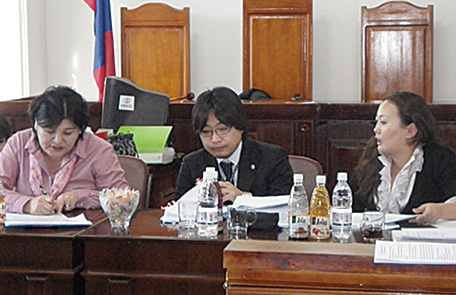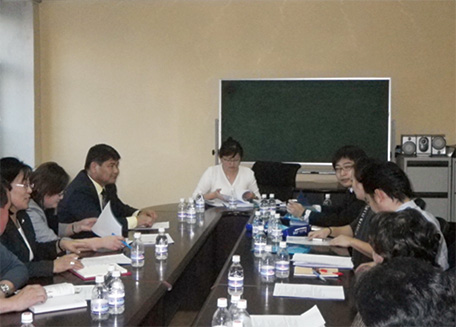Japan's Official Development Assistance White Paper 2012
Stories from the field 7
Japanese Serve on Mongolian Bill Drafting Committee
– Supporting Mediation System Legislation –

Mr. Oka giving a lecture to train mediators in order to prepare for mediation to take place across all of Mongolia (Photo: Hideo Oka)
Mongolia lies in the middle of the Eurasian continent, sandwiched between the giants of China and Russia. Mongolia conjures up images of nomadic people made easy-going by the magnificent nature within the country's borders. In reality, democratization and the introduction of a market economy in 1990 pushed around half of its population into urban areas and exacerbated troubles over financial and family matters. Japan has a mediation system by which legal problems between citizens can be settled through discussion. In Mongolia, however, there is no concept of mediation, and all cases filed are deliberated in courts. This costs the courts immense amount of time and money, which places a huge burden on both of the judicial branch of the government and the people of Mongolia.
From 2006 to 2008, Japan had provided assistance to improve the Mongolian justice system. The Association of Mongolian Advocates received the assistance, which included support for mediation system centers' activities and training for mediators. The Japanese assistance played a major role in establishing the concept of mediation in the Mongolian legal community. The Supreme Court of Mongolia sought to reduce the number of trials, and it requested Japan's cooperation toward making a genuine effort to introduce a mediation system to Mongolia. Thus, the Project for Strengthening Mediation System was born.
In May 2010, Hideo Oka was dispatched to Mongolia as a JICA expert. Mr. Oka began discussing a mediation system in a working group (WG) as soon as he arrived in Mongolia. At the beginning, he was not sure what to do, but he felt the fervent need of the legal professionals in the WG for a mediation system and recognized that his calling was to respond to that need. After that, the WG began to work planning a mediation system for the courts and training mediators. Mr. Oka reached out to judges who opposed the mediation system: "Many of those who rejected mediation were older people. They studied abroad in the Soviet Union or Germany, and they hold a strong responsibility to use the law to resolve problems. They were a bit stubborn, but they had worked in the legal field for a long time and deserved respect. I am stubborn myself, so I felt close to them. As I kept reaching out to them, they began to show their understanding."

Discussing the mediation system in a Supreme Court Working Group meeting (Photo: Hideo Oka)
After one year of preparation, the court mediation system was launched in May 2011. Courts in the capital city of Ulaanbaatar and in Darkhan, Mongolia's second-largest city, were chosen to serve as pilot courts (courts at which the mediation system would be tested). These courts employed the mediation system on an experimental basis and handled actual cases. By September 2012, a total of 348 cases had been settled through mediation in the two cities. "Many participants in the test of the mediation system told us that the mediation had been effective, and court workers indicated that the introduction of the system had reduced their workload," Mr. Oka said. "I believe that the results of mediation in pilot courts and the reactions of those involved proved that it would be beneficial to introduce a court mediation system to Mongolia."
The summer of 2011 revealed further developments. The office of the president requested cooperation to enact the mediation system into law. It was the first time in post-democratization Mongolia that non-Mongolians had been officially appointed to a bill drafting committee. Mr. Oka was appointed to the committee and worked very enthusiastically, pleased to be able to take part in drafting the laws. The committee deliberated and worked late into the evening day after day, and they submitted the bill to the Parliament of Mongolia that winter. The bill was passed in May 2012, and the mediation act comes into effect on the 1st of July 2013. From that day forth, mediation will occur at the court of first instance throughout Mongolia.
Mr. Oka is now traveling around Mongolia to introduce the mediation system by seminars. The important task for now is to spread the word about the system to the people of Mongolia to prepare for the enforcement of the mediation act. "I would like to see the completion of the mediation system, if I can," Mr. Oka said. "My only hope is that this system is operated in an impartial and fair manner, and brings happiness to Mongolian people. I want Mongolian mediators to be kind and respected by people."
